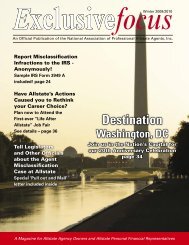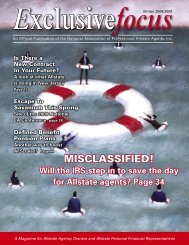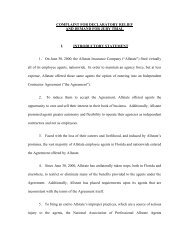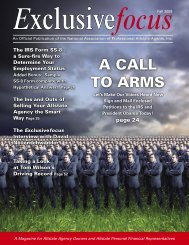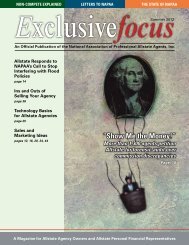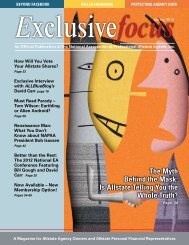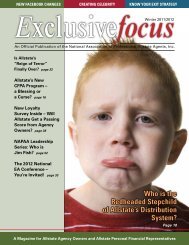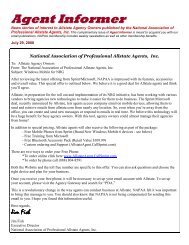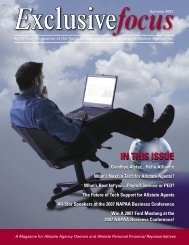EF summer 08.indd - National Association of Professional Allstate ...
EF summer 08.indd - National Association of Professional Allstate ...
EF summer 08.indd - National Association of Professional Allstate ...
You also want an ePaper? Increase the reach of your titles
YUMPU automatically turns print PDFs into web optimized ePapers that Google loves.
feature<br />
How Safe is Your Identity<br />
BY STACY NUTTER<br />
It wasn’t until 1997 that credit cards<br />
could be “securely” used online. Ten years<br />
later, data breaches and identity thefts<br />
are exploding in volume. How important<br />
is control <strong>of</strong> data Pretty important. Data<br />
leads to information, information leads<br />
to knowledge and knowledge is power.<br />
Power leads to cash and cash is king! You<br />
would have thought, given its importance,<br />
more attention would have been<br />
paid to preserving this asset over the<br />
past 10 years. Apparently, that’s not the<br />
case and identity theft is now the fastest<br />
growing crime in America.<br />
Probably the most common form <strong>of</strong><br />
identity theft is financial. Someone uses<br />
your name and social security number<br />
to obtain new credit to purchase cell<br />
phones, rent apartments, set up corporations<br />
and/or open new credit cards in<br />
your name – any one <strong>of</strong> which can destroy<br />
a good credit rating in an instant.<br />
Everything you have worked your entire<br />
life to build is suddenly gone. You find<br />
yourself paralyzed by the daunting task<br />
in front <strong>of</strong> you – closing accounts you<br />
didn’t open, repairing your credit report<br />
and reclaiming your identity.<br />
Consider these facts.<br />
• Identity theft takes place every 3.1<br />
seconds in the U.S. That’s 20 victims every<br />
minute. Last year alone there were 10 million<br />
victims <strong>of</strong> Identity Theft. In the first<br />
quarter <strong>of</strong> 2008, there were more than 8.3<br />
million identity breaches. People are annoyed<br />
and understandably anxious over the<br />
loss or theft <strong>of</strong> their personal information<br />
and feel that they have no control over it.<br />
• It can take approximately 300<br />
hours and $1500-$8000 to clean up the<br />
mess that identity theft leaves behind.<br />
• A good identity thief will get your<br />
information and hold it for at least a year<br />
before using or selling it.<br />
• Employers are responsible for the<br />
security <strong>of</strong> their employees’ and their customers’<br />
personal information. If there is a<br />
breach <strong>of</strong> any kind, employers are required<br />
to report it to the Federal Trade Commission<br />
(FTC) and send out letters to everyone<br />
affected. If an employee’s identity is<br />
stolen as a result <strong>of</strong> the breach, they can<br />
use company time (avg. 300 hours) to remediate<br />
their credit and cure the breach.<br />
This process cuts down on productivity<br />
and employees lose confidence in their<br />
employer’s ability to maintain secure files.<br />
• Statistics show that once a company<br />
has had a breach that could result in<br />
identity theft, nearly 1/3 <strong>of</strong> consumers or<br />
employees will terminate their relationship<br />
with the company.<br />
• Children are vulnerable because<br />
they do not use their social security<br />
numbers to obtain credit until they are<br />
18 years <strong>of</strong> age. By this time, an identity<br />
thief could have been utilizing their<br />
identity for years.<br />
• Identity theft costs everyone money.<br />
Last year TJMaxx paid out over $60<br />
million to VISA and MasterCard for a<br />
breach in the security <strong>of</strong> their customers.<br />
• The IRS now has problems securing<br />
the information on your filed return.<br />
The Treasury Inspector General for Tax<br />
Administration stated that “a hacker<br />
could gain full control because <strong>of</strong> inadequate<br />
security controls” according to a<br />
recent report. “A disgruntled employee,<br />
contractor or hacker could reconfigure<br />
routers and switches to disrupt computer<br />
operations and steal taxpayer information<br />
in a number <strong>of</strong> ways, including diverting<br />
the information to unauthorized<br />
systems” the report says. This report was<br />
printed in the first quarter <strong>of</strong> 2008!<br />
• Some retailers have decided that<br />
it is cheaper to pay the penalties rather<br />
than update the security <strong>of</strong> their credit<br />
card transaction systems. Unfortunately,<br />
that isn’t true. Remember the TJ Maxx<br />
incident This lax attitude should scare<br />
each and every one <strong>of</strong> us!<br />
• Identity thieves can access and use<br />
your medical benefits and you may not<br />
know it for years. This is particularly dangerous<br />
because the “health information” <strong>of</strong><br />
Summer 2008 Exclusivefocus — 17



